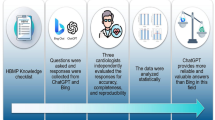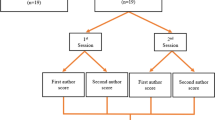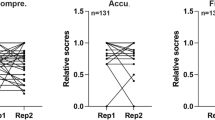Abstract
Background
The Chat Generative Pre-trained Transformer (ChatGPT) allows students, researchers, and patients in the medical field to access information easily and has gained attention nowadays. We aimed to evaluate the credibility of ChatGPT according to the guidelines for the assessment of obesity in type 2 diabetes (T2D), which is one of the major concerns of this century.
Materials and method
In this cross-sectional non-human subject study, experienced endocrinologists posed 20 questions to ChatGPT in subsections, which were assessments and different treatment options for obesity according to the American Diabetes Association and American Association of Clinical Endocrinology guidelines. The responses of ChatGPT were classified into four categories: compatible, compatible but insufficient, partially incompatible and incompatible with the guidelines.
Results
ChatGPT demonstrated a systematic approach to answering questions and recommended consulting a healthcare provider to receive personalized advice based on the specific health needs and circumstances of patients. The compatibility of ChatGPT with the guidelines was 100% in the assessment of obesity in type 2 diabetes; however, it was lower in the therapy sections, which included nutritional, medical, and surgical approaches to weight loss. Furthermore, ChatGPT required additional prompts for responses that were evaluated as “compatible but insufficient” to provide all the information in the guidelines.
Conclusion
The assessment and management of obesity in T2D are highly individualized. Despite ChatGPT’s comprehensive and understandable responses, it should not be used as a substitute for healthcare professionals’ patient-centered approach.
This is a preview of subscription content, access via your institution
Access options
Subscribe to this journal
Receive 12 print issues and online access
$259.00 per year
only $21.58 per issue
Buy this article
- Purchase on Springer Link
- Instant access to full article PDF
Prices may be subject to local taxes which are calculated during checkout
Similar content being viewed by others
Data availability
The datasets generated during and/or analyzed during the current study are available from the corresponding author on reasonable request.
References
Zimmet P, Alberti KG, Shaw J. Global and societal implications of the diabetes epidemic. Nature. 2001;414:782–7.
ElSayed NA, Aleppo G, Aroda VR, Bannuru RR, Brown FM, Bruemmer D, et al. 8. Obesity and weight management for the prevention and treatment of type 2 diabetes: standards of care in diabetes—2023. Diabetes Care. 2022;46:S128–39.
Narayan KM, Boyle JP, Thompson TJ, Gregg EW, Williamson DF. Effect of BMI on lifetime risk for diabetes in the U.S. Diabetes Care. 2007;30:1562–6.
Goldstein DJ. Beneficial health effects of modest weight loss. Int J Obes Relat Metab Disord. 1992;16:397–415.
Pastors JG, Warshaw H, Daly A, Franz M, Kulkarni K. The evidence for the effectiveness of medical nutrition therapy in diabetes management. Diabetes Care. 2002;25:608–13.
Sarma S, Sockalingam S, Dash S. Obesity as a multisystem disease: trends in obesity rates and obesity-related complications. Diabetes Obes Metab. 2021;23:3–16.
Kung TH, Cheatham M, Medenilla A, Sillos C, De Leon L, Elepaño C, et al. Performance of ChatGPT on USMLE: potential for AI-assisted medical education using large language models. PLoS Digital Health. 2023;2:e0000198.
Xue VW, Lei P, Cho WC. The potential impact of ChatGPT in clinical and translational medicine. Clin Transl Med. 2023;13:e1216.
Christiano PF, Leike J, Brown T, Martic M, Legg S, Amodei D. Deep reinforcement learning from human preferences. Adv Neural Inf Process Syst. 2017. p. 30.
Commission E, Directorate-General for Communications Networks C, Technology. Ethics guidelines for trustworthy AI. Publications Office; 2019.
Dave T, Athaluri SA, Singh S. ChatGPT in medicine: an overview of its applications, advantages, limitations, future prospects, and ethical considerations. Front Artif Intell. 2023;6:1169595.
Yeo YH, Samaan JS, Ng WH, Ting PS, Trivedi H, Vipani A, et al. Assessing the performance of ChatGPT in answering questions regarding cirrhosis and hepatocellular carcinoma. Clin Mol Hepatol. 2023;29:721–32.
Eysenbach G, Powell J, Kuss O, Sa E-R. Empirical studies assessing the quality of health information for consumers on the world wide web: a systematic review. JAMA. 2002;287:2691–700.
Homolak J. Opportunities and risks of ChatGPT in medicine, science, and academic publishing: a modern Promethean dilemma. Croat Med J. 2023;64:1–3.
Arif TB, Munaf U, Ul-Haque I. The future of medical education and research: is ChatGPT a blessing or blight in disguise? Med Educ Online. 2023;28:2181052.
Samson SL, Vellanki P, Blonde L, Christofides EA, Galindo RJ, Hirsch IB, et al. American association of clinical endocrinology consensus statement: comprehensive type 2 diabetes management algorithm—2023 update. Endocr Pract. 2023;29:305–40.
Roosan D, Samore M, Jones M, Livnat Y, Clutter J. Big-data based decision-support systems to improve clinicians’ cognition. 2016 IEEE International Conference on Healthcare Informatics (ICHI). IEEE; 2016. p. 285–8.
Howard A, Hope W, Gerada A. ChatGPT and antimicrobial advice: the end of the consulting infection doctor? Lancet Infect Dis. 2023;23:405–6.
Haver HL, Ambinder EB, Bahl M, Oluyemi ET, Jeudy J, Yi PH. Appropriateness of breast cancer prevention and screening recommendations provided by ChatGPT. Radiology. 2023;307:e230424.
Sarraju A, Bruemmer D, Van Iterson E, Cho L, Rodriguez F, Laffin L. Appropriateness of cardiovascular disease prevention recommendations obtained from a popular online chat-based artificial intelligence model. JAMA. 2023;329:842–4.
Schulte B. Capacity of ChatGPT to identify guideline-based treatments for advanced solid tumors. Cureus. 2023;15:e37938.
Samaan JS, Yeo YH, Rajeev N, Hawley L, Abel S, Ng WH, et al. Assessing the accuracy of responses by the language model ChatGPT to questions regarding bariatric surgery. Obes Surg. 2023;33:1790–6.
Cascella M, Montomoli J, Bellini V, Bignami E. Evaluating the feasibility of ChatGPT in healthcare: an analysis of multiple clinical and research scenarios. J Med Syst. 2023;47:33.
Sng GGR, Tung JYM, Lim DYZ, Bee YM. Potential and pitfalls of ChatGPT and natural-language artificial intelligence models for diabetes education. Diabetes Care. 2023;46:e103–5.
Vaishya R, Misra A, Vaish A. ChatGPT: is this version good for healthcare and research? Diabetes Metab Syndr Clin Res Rev. 2023;17:102744.
Temsah O, Khan SA, Chaiah Y, Senjab A, Alhasan K, Jamal A, et al. Overview of early ChatGPT’s presence in medical literature: insights from a hybrid literature review by ChatGPT and human experts. Cureus. 2023;15:e37281.
Hsu Y-C, Ching Y-H. Generative artificial intelligence in education, part one: the dynamic frontier. TechTrends. 2023;67:603–607.
Shao CY, Li H, Liu XL, Li C, Yang LQ, Zhang YJ, et al. Appropriateness and comprehensiveness of using ChatGPT for perioperative patient education in thoracic surgery in different language contexts: survey study. Interact J Med Res. 2023;12:e46900.
Acknowledgements
We used the generative AI tool ChatGPT-3.5 to obtain responses to our questions that were prepared for the evaluation of credibility. In addition to this, AI tools were not used in the generation of the manuscript in our study.
Author information
Authors and Affiliations
Contributions
All authors contributed to the study conception and design. The first draft of the manuscript was written by TB, FBT and all authors commented on previous versions of the manuscript. All authors read and approved the final manuscript.
Corresponding author
Ethics declarations
Competing interests
The authors declare no competing interests.
Additional information
Publisher’s note Springer Nature remains neutral with regard to jurisdictional claims in published maps and institutional affiliations.
Rights and permissions
Springer Nature or its licensor (e.g. a society or other partner) holds exclusive rights to this article under a publishing agreement with the author(s) or other rightsholder(s); author self-archiving of the accepted manuscript version of this article is solely governed by the terms of such publishing agreement and applicable law.
About this article
Cite this article
Barlas, T., Altinova, A.E., Akturk, M. et al. Credibility of ChatGPT in the assessment of obesity in type 2 diabetes according to the guidelines. Int J Obes 48, 271–275 (2024). https://doi.org/10.1038/s41366-023-01410-5
Received:
Revised:
Accepted:
Published:
Issue Date:
DOI: https://doi.org/10.1038/s41366-023-01410-5
This article is cited by
-
Comment on “Credibility of ChatGPT in the assessment of obesity in type 2 diabetes according to the guidelines”
International Journal of Obesity (2024)
-
Availability of ChatGPT to provide medical information for patients with kidney cancer
Scientific Reports (2024)
-
GPT-agents based on medical guidelines can improve the responsiveness and explainability of outcomes for traumatic brain injury rehabilitation
Scientific Reports (2024)
-
Critical evaluation of “Credibility of ChatGPT in the assessment of obesity in type 2 diabetes according to the guidelines”
International Journal of Obesity (2024)



